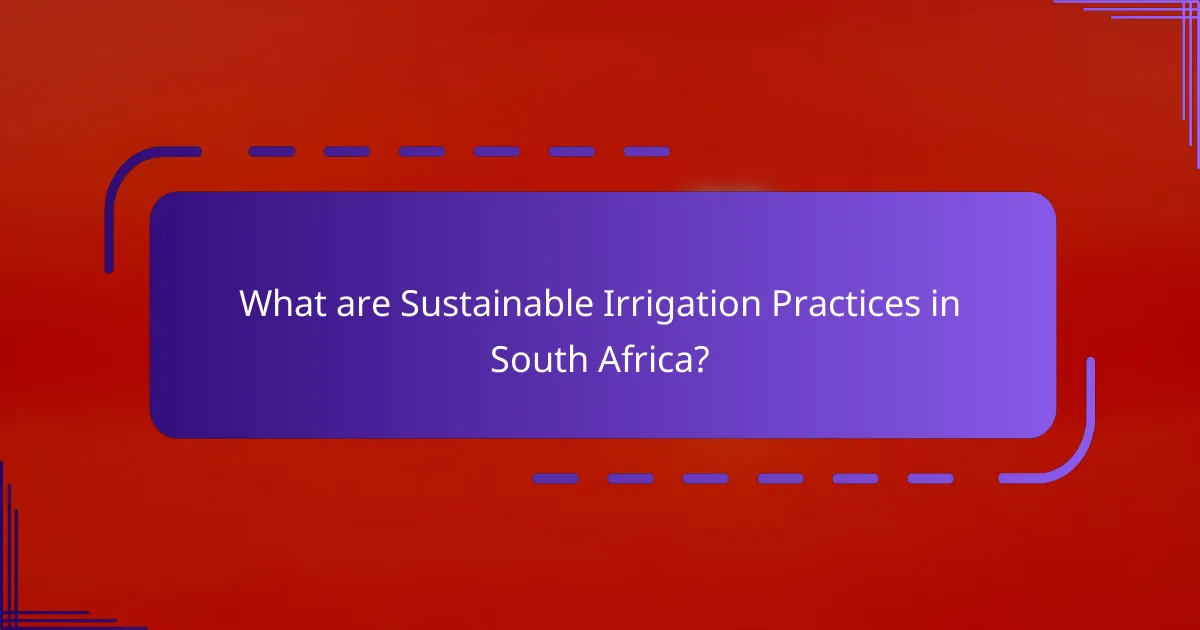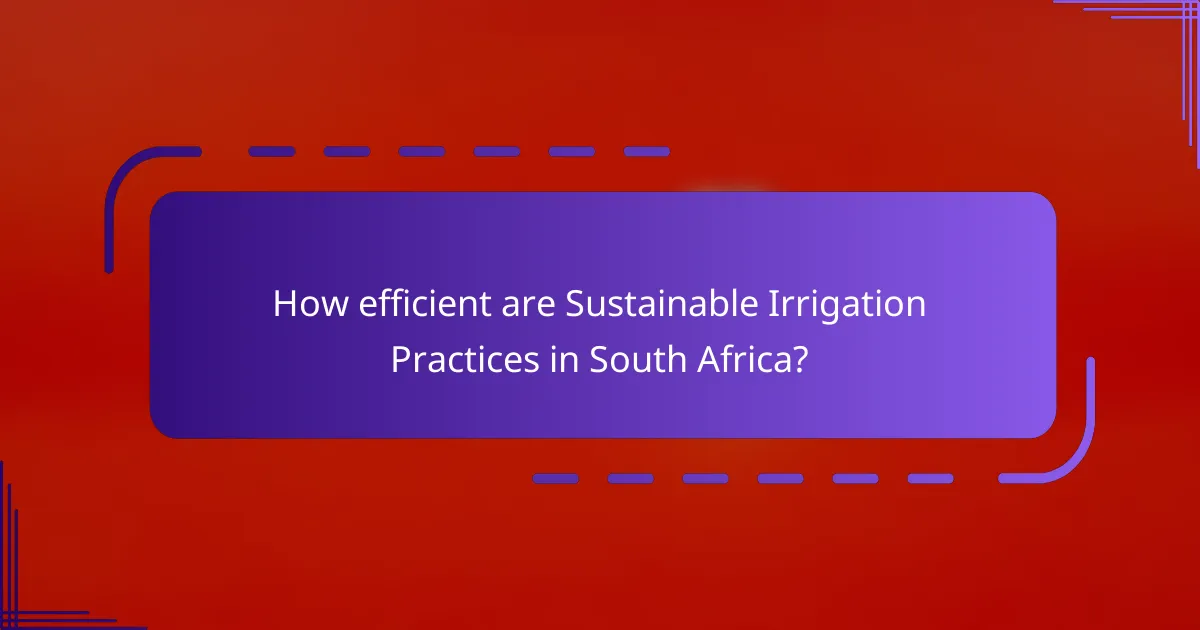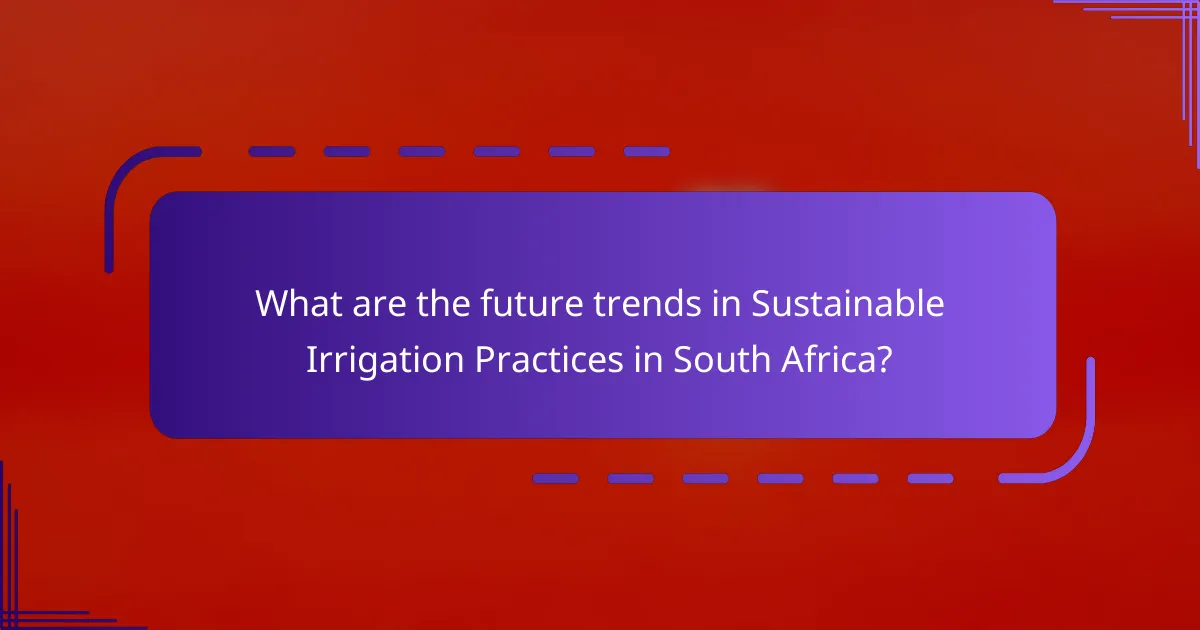Sustainable irrigation practices in South Africa focus on methods such as drip irrigation, rainwater harvesting, and soil moisture sensors to enhance agricultural efficiency. These practices significantly improve water use efficiency, with studies indicating potential reductions in water usage by up to 60% and increases in crop yields by 20-30%. The integration of precision irrigation technologies and renewable energy sources, like solar-powered systems, is becoming more prevalent, further optimizing water management. Overall, these approaches contribute to conserving natural resources while boosting agricultural productivity in the region.

What are Sustainable Irrigation Practices in South Africa?
Sustainable irrigation practices in South Africa include drip irrigation, rainwater harvesting, and the use of soil moisture sensors. Drip irrigation delivers water directly to the plant roots, minimizing water wastage. Rainwater harvesting captures and stores rainwater for agricultural use, reducing reliance on groundwater. Soil moisture sensors provide real-time data on soil moisture levels, allowing for precise irrigation scheduling. These practices enhance water efficiency and crop yield while preserving natural resources. According to the Department of Agriculture, Forestry and Fisheries, these methods can improve water use efficiency by up to 50%.
How do Sustainable Irrigation Practices differ from traditional methods?
Sustainable irrigation practices differ from traditional methods primarily in their approach to resource management. Sustainable practices focus on conserving water and minimizing environmental impact. They often utilize techniques such as drip irrigation and rainwater harvesting. Traditional methods, like flood irrigation, tend to waste water and can lead to soil degradation. Research indicates that sustainable practices can reduce water usage by up to 50%. This efficiency not only preserves water resources but also enhances crop yield over time. In South Africa, adopting these practices has shown improved resilience to drought conditions.
What are the key characteristics of sustainable irrigation?
Sustainable irrigation is characterized by efficiency, environmental protection, and social equity. It utilizes water resources judiciously to minimize waste. Techniques such as drip irrigation and rainwater harvesting enhance water use efficiency. Sustainable practices also promote soil health and reduce erosion. They consider local ecosystems and biodiversity, ensuring minimal negative impact. Furthermore, sustainable irrigation supports equitable access to water for all farmers. It integrates advanced technologies for monitoring and managing water resources effectively. These characteristics contribute to long-term agricultural productivity and resilience against climate change.
Why is sustainability important in irrigation practices?
Sustainability is important in irrigation practices because it ensures the long-term availability of water resources. Sustainable irrigation reduces water waste and promotes efficient water use. This approach helps maintain the balance of local ecosystems. It also supports agricultural productivity without depleting natural resources. According to the Food and Agriculture Organization (FAO), sustainable practices can increase crop yields by 20-30%. Implementing sustainable irrigation methods can mitigate the impacts of climate change on water availability. In South Africa, where water scarcity is a significant concern, sustainability in irrigation is crucial for food security.
What types of Sustainable Irrigation Practices are implemented in South Africa?
Sustainable irrigation practices implemented in South Africa include drip irrigation, rainwater harvesting, and conservation tillage. Drip irrigation delivers water directly to the plant roots, minimizing evaporation and runoff. This method can reduce water usage by up to 60% compared to traditional methods. Rainwater harvesting collects and stores rainwater for irrigation, enhancing water availability during dry periods. Conservation tillage minimizes soil disturbance, improving water retention and reducing erosion. These practices collectively contribute to efficient water management and increased agricultural productivity in the region.
What are the most common types of irrigation systems used?
The most common types of irrigation systems used include drip irrigation, sprinkler irrigation, and surface irrigation. Drip irrigation delivers water directly to the plant roots through a network of tubing and emitters. This method minimizes water wastage and is highly efficient. Sprinkler irrigation uses a system of pipes and pumps to spray water over crops, simulating natural rainfall. It is versatile and suitable for various crop types. Surface irrigation involves applying water directly to the soil surface, allowing it to flow by gravity. This method is widely used in South Africa for its simplicity and low cost. Each system has its advantages and is chosen based on specific agricultural needs and environmental conditions.
How do drip and sprinkler systems contribute to sustainability?
Drip and sprinkler systems contribute to sustainability by enhancing water efficiency in agricultural practices. Drip irrigation delivers water directly to the plant roots, minimizing evaporation and runoff. This targeted approach can reduce water usage by up to 60% compared to traditional irrigation methods. Sprinkler systems also improve water distribution, ensuring even coverage and reducing waste. Both systems help maintain soil moisture levels, which supports healthy crop growth. Additionally, these methods can lead to higher crop yields while using less water, promoting sustainable farming practices. Studies show that implementing these systems can significantly lower the carbon footprint of agricultural operations.
What role does technology play in Sustainable Irrigation Practices?
Technology enhances sustainable irrigation practices by improving water management and efficiency. Precision irrigation systems, such as drip and sprinkler technology, deliver water directly to plant roots. This reduces water waste and ensures optimal moisture levels. Sensors and automation allow for real-time monitoring of soil moisture and weather conditions. Such data-driven approaches enable farmers to irrigate only when necessary. Research indicates that these technologies can reduce water usage by up to 50% while maintaining crop yields. Additionally, mobile applications facilitate better planning and resource allocation. Overall, technology plays a crucial role in maximizing water conservation and promoting sustainable agriculture.
How can precision agriculture enhance irrigation efficiency?
Precision agriculture enhances irrigation efficiency by utilizing technology to optimize water usage. It employs sensors and data analytics to monitor soil moisture levels in real-time. This allows farmers to apply water only when necessary, reducing waste. According to a study by the International Journal of Agricultural and Biological Engineering, precision irrigation can save up to 30% of water compared to traditional methods. Additionally, variable rate irrigation systems adjust water application based on crop needs. This targeted approach promotes healthier crops and maximizes yield. Overall, precision agriculture leads to sustainable water management in farming practices.
What are the benefits of using smart irrigation systems?
Smart irrigation systems enhance water efficiency and crop yield. These systems use technology to optimize water usage based on real-time data. They reduce water waste by delivering precise amounts of water when needed. Studies show that smart irrigation can save up to 50% more water than traditional methods. Additionally, they improve plant health by providing consistent moisture levels. This leads to higher crop productivity and quality. Smart irrigation systems also minimize energy costs associated with water pumping. They can be integrated with weather forecasts to adapt irrigation schedules accordingly. Overall, these benefits contribute to more sustainable agricultural practices in South Africa.

How efficient are Sustainable Irrigation Practices in South Africa?
Sustainable irrigation practices in South Africa are highly efficient. These practices conserve water while maximizing crop yield. Techniques such as drip irrigation reduce water usage by up to 60%. Research indicates that these methods improve soil health and reduce salinity. Additionally, the use of rainwater harvesting enhances water availability. Studies show that adopting these practices can increase agricultural productivity significantly. For instance, a study by the Water Research Commission found that sustainable irrigation can boost yields by 20-30%. Overall, sustainable irrigation practices are a key factor in enhancing agricultural efficiency in South Africa.
What metrics are used to measure irrigation efficiency?
Irrigation efficiency is measured using several key metrics. The most common metric is the application efficiency, which calculates the percentage of water that effectively reaches the plant roots. Another important metric is the conveyance efficiency, which measures the water lost during transportation from the source to the field. Additionally, the irrigation uniformity metric assesses how evenly water is distributed across the irrigated area. The overall irrigation efficiency combines these metrics to provide a comprehensive assessment of the system’s performance. For example, studies show that well-designed irrigation systems can achieve application efficiencies of 80% or higher.
How does water conservation relate to irrigation efficiency?
Water conservation directly enhances irrigation efficiency. Efficient irrigation systems reduce water waste during agricultural practices. This reduction leads to more water available for crops. For example, drip irrigation systems can save up to 60% more water compared to traditional methods. Additionally, conserving water helps maintain soil health and structure. Healthy soil retains moisture better, further improving irrigation effectiveness. Overall, integrating water conservation strategies maximizes crop yield while minimizing water usage.
What are the economic impacts of efficient irrigation practices?
Efficient irrigation practices significantly enhance agricultural productivity and economic viability. They lead to higher crop yields by ensuring optimal water supply. This increase in yield directly correlates with higher income for farmers. Efficient irrigation systems reduce water wastage, lowering operational costs. For instance, drip irrigation can save up to 50% more water compared to traditional methods. Additionally, these practices can improve soil health, leading to long-term sustainability. Studies show that regions adopting efficient irrigation see a boost in local economies. Overall, efficient irrigation practices contribute to food security and economic stability in agricultural sectors.
How do Sustainable Irrigation Practices affect crop yield?
Sustainable irrigation practices positively affect crop yield by optimizing water usage and improving soil health. These practices, such as drip irrigation and rainwater harvesting, minimize water waste. They ensure that crops receive adequate moisture without over-irrigation. Studies show that crops irrigated sustainably can yield up to 30% more compared to traditional methods. Additionally, sustainable practices enhance soil structure and fertility. This leads to better nutrient retention and root development. Improved soil health directly contributes to increased crop resilience and productivity. Research indicates that sustainable irrigation can lead to higher economic returns for farmers.
What is the relationship between irrigation efficiency and crop production?
Irrigation efficiency directly impacts crop production. Higher irrigation efficiency leads to better water management. Efficient systems minimize water loss through evaporation and runoff. This ensures that more water reaches the crops. Studies show that improved irrigation efficiency can increase crop yields by 20-50%. For example, drip irrigation systems can deliver water directly to plant roots. This method reduces water usage while enhancing growth conditions. Therefore, optimizing irrigation efficiency is crucial for maximizing agricultural output.
How can sustainable practices improve soil health and crop yield?
Sustainable practices improve soil health and crop yield by enhancing nutrient availability and maintaining soil structure. These practices include crop rotation, cover cropping, and reduced tillage. Crop rotation prevents nutrient depletion by alternating different crops, which enhances biodiversity. Cover cropping protects soil from erosion and adds organic matter, improving soil fertility. Reduced tillage minimizes soil disturbance, preserving soil structure and microbial life. Research shows that these methods can increase crop yields by up to 30% compared to conventional practices. Additionally, sustainable practices promote water retention and reduce the need for chemical fertilizers. This leads to healthier soils and more resilient crops in the long term.
What challenges do farmers face in implementing Sustainable Irrigation Practices?
Farmers face several challenges in implementing sustainable irrigation practices. Limited access to funding hinders the adoption of modern irrigation technologies. Additionally, inadequate knowledge about sustainable practices can lead to improper implementation. Water scarcity in certain regions complicates the availability of resources for irrigation. Soil quality issues can affect the effectiveness of irrigation methods. Furthermore, climate variability poses risks to crop yields and irrigation efficiency. Lastly, regulatory constraints may restrict the use of certain irrigation techniques. These challenges collectively impact the successful implementation of sustainable irrigation practices in South Africa.
What are the financial barriers to adopting sustainable practices?
The financial barriers to adopting sustainable practices include high initial investment costs and ongoing maintenance expenses. Many sustainable technologies require substantial upfront capital, which can deter farmers from making the switch. For instance, efficient irrigation systems often involve advanced equipment that may not fit within tight budgets. Additionally, the lack of access to financing options can limit farmers’ ability to invest in these technologies. Research indicates that 70% of smallholder farmers in South Africa face significant financial constraints. These barriers ultimately hinder the widespread adoption of sustainable irrigation practices, affecting overall agricultural efficiency and crop yield.
How do climatic conditions impact the effectiveness of these practices?
Climatic conditions significantly impact the effectiveness of sustainable irrigation practices. Temperature, rainfall, and humidity levels directly influence water availability and crop water requirements. For instance, higher temperatures increase evaporation rates, reducing soil moisture. Additionally, inconsistent rainfall patterns can lead to either water scarcity or excess, affecting irrigation scheduling. Studies show that regions with optimal rainfall can achieve better crop yields with less irrigation. Conversely, arid areas necessitate more advanced irrigation techniques to maintain crop health. The effectiveness of practices like drip irrigation is maximized in climates where water conservation is critical, as evidenced by improved crop yields in drier regions.

What are the future trends in Sustainable Irrigation Practices in South Africa?
Future trends in sustainable irrigation practices in South Africa include the increased adoption of precision irrigation technologies. These technologies utilize data analytics and sensor systems to optimize water usage. Drip irrigation systems are gaining popularity due to their efficiency in targeting plant roots. Rainwater harvesting is also becoming more common, helping to supplement water supplies during dry seasons.
Furthermore, the integration of renewable energy sources, such as solar-powered irrigation systems, is on the rise. This reduces reliance on fossil fuels and lowers operational costs. Conservation agriculture practices are being promoted to enhance soil health and water retention.
Research indicates that these trends can significantly improve water efficiency and crop yields. A study by the Water Research Commission highlights that implementing these practices can reduce water usage by up to 30%. Overall, these trends reflect a shift towards more resilient and sustainable agricultural practices in South Africa.
How is climate change influencing irrigation strategies?
Climate change is significantly influencing irrigation strategies by altering precipitation patterns and increasing evaporation rates. These changes lead to water scarcity in many regions. Farmers are adapting by implementing more efficient irrigation systems, such as drip and sprinkler irrigation. These systems reduce water waste and optimize usage during dry spells. Additionally, climate change is prompting the use of soil moisture sensors. These sensors help in monitoring soil conditions to determine the optimal irrigation timing. Research indicates that adopting these strategies can enhance crop yields under changing climatic conditions. For instance, a study by the University of Cape Town found that efficient irrigation practices improved water use efficiency by up to 30%. Thus, climate change is driving innovation and adaptation in irrigation practices.
What innovations are emerging in sustainable irrigation technology?
Innovations in sustainable irrigation technology include drip irrigation systems, smart sensors, and automated irrigation controllers. Drip irrigation delivers water directly to plant roots, minimizing evaporation and runoff. Smart sensors monitor soil moisture levels, ensuring precise water application. Automated irrigation controllers adjust watering schedules based on weather forecasts, optimizing water use. Additionally, rainwater harvesting systems are gaining traction, capturing and storing rain for irrigation purposes. These technologies enhance water efficiency and reduce waste. According to the Food and Agriculture Organization, these innovations can lead to a 30-50% reduction in water usage for agriculture.
What best practices should farmers follow for effective sustainable irrigation?
Farmers should implement several best practices for effective sustainable irrigation. First, they should adopt drip irrigation systems. Drip irrigation delivers water directly to the plant roots. This method reduces water waste significantly. Studies show that drip systems can save up to 50% more water than traditional methods.
Second, farmers should schedule irrigation based on soil moisture levels. Using soil moisture sensors helps determine the exact water needs of crops. This practice prevents over-irrigation and conserves water resources. Research indicates that precise scheduling can improve crop yield by 20%.
Third, mulching is recommended to retain soil moisture. Organic mulches reduce evaporation and suppress weeds. This can lead to better water retention in the soil. The use of mulch has been shown to enhance soil quality over time.
Finally, farmers should consider rainwater harvesting. Capturing and storing rainwater provides an additional water source. This practice can supplement irrigation needs during dry periods. Implementing rainwater harvesting can increase water availability for crops by up to 30%.
How can farmers optimize water usage in their irrigation systems?
Farmers can optimize water usage in their irrigation systems by implementing precision irrigation techniques. These techniques include drip irrigation, which delivers water directly to plant roots, minimizing evaporation and runoff. Additionally, farmers can utilize soil moisture sensors to monitor water levels and adjust irrigation schedules accordingly. This ensures water is applied only when necessary, reducing waste.
Furthermore, rainwater harvesting systems can be installed to collect and store rainwater for irrigation use. Crop rotation and planting drought-resistant varieties also contribute to efficient water usage. According to a study by the Food and Agriculture Organization, these methods can lead to water savings of up to 50% in some regions.
What resources are available for farmers to improve their irrigation practices?
Farmers can access various resources to improve their irrigation practices. These include government programs that offer financial assistance for irrigation upgrades. Agricultural extension services provide training on efficient irrigation techniques. Research institutions publish studies on innovative irrigation technologies. NGOs often support farmers with water management training. Online platforms offer tools for irrigation scheduling and monitoring. Local cooperatives may provide shared resources such as equipment. Access to soil moisture sensors helps farmers optimize water usage. Lastly, workshops and seminars promote knowledge sharing among farmers.
Sustainable irrigation practices in South Africa focus on efficient water management techniques such as drip irrigation, rainwater harvesting, and soil moisture sensors. These practices enhance water efficiency, crop yield, and soil health while minimizing environmental impact. The article explores the differences between sustainable and traditional irrigation methods, the key characteristics of sustainable practices, and their economic benefits. Additionally, it addresses challenges farmers face in implementing these practices and highlights future trends and innovations in sustainable irrigation technology. Overall, the article emphasizes the importance of sustainability in ensuring long-term agricultural productivity and resilience against climate change.